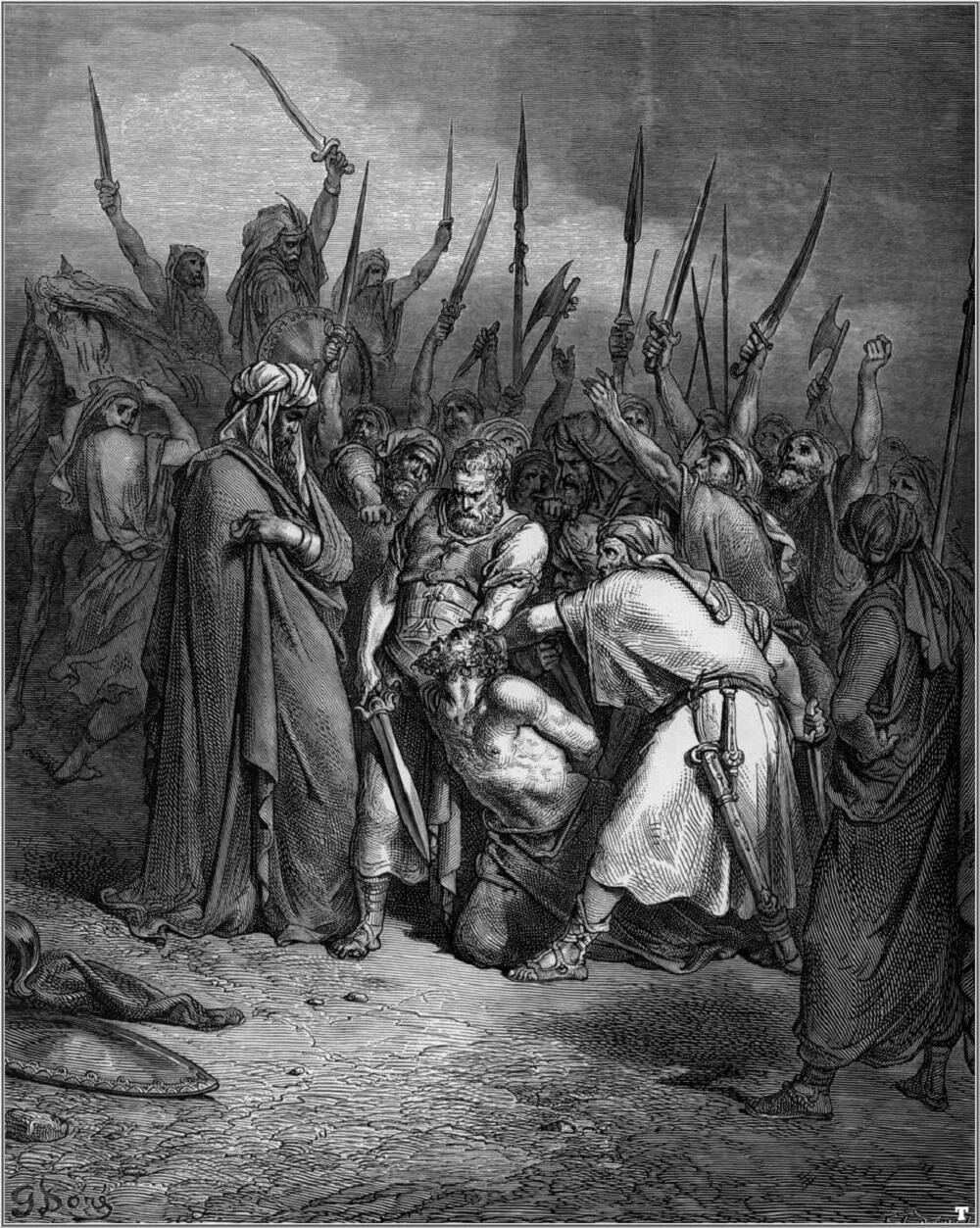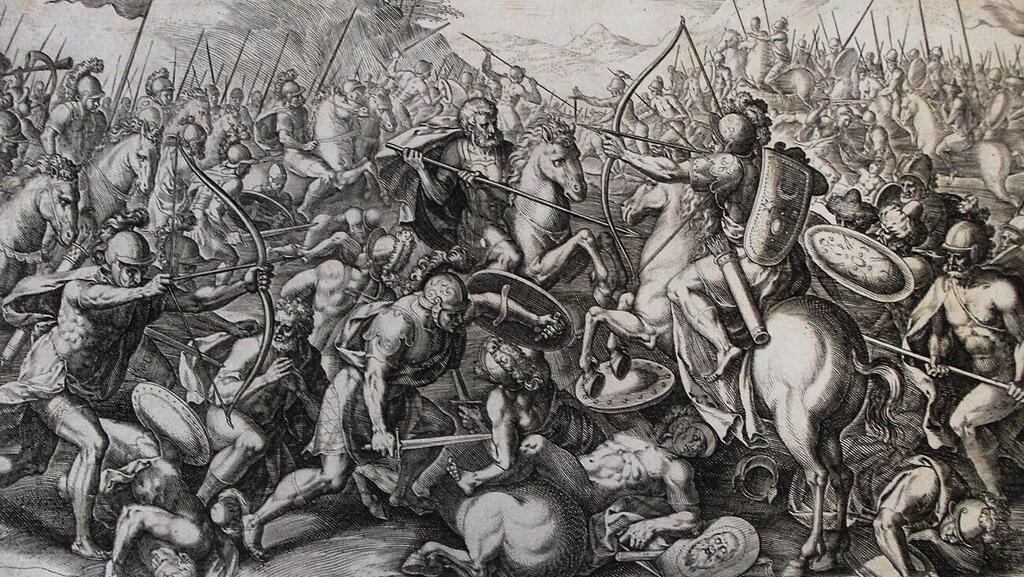Amalek is a tribe (or several united tribes) of desert nomads mentioned in the Bible. "According to the scriptures, Amalek was one of the sons of Eliphaz, the son of Esau, by his concubine Timna, thus making him the grandson of Esau who originated the Edomites," says Dr. Ahuva Ashman from Tel Aviv University’s Department of Bible.
"Although Amalek was born five generations after our forefather Abraham, "the field of the Amalekites" is mentioned long before Amalek the grandson of Esau, was born (Genesis, Chapter 14). Moses ben Nachman (the Ramban) explains that in ancient times, Amalek was a respected figure who governed that land (the field of the Amalekites), and Eliphaz named his son after the ruler of that area.
"Amalek, the son of Eliphaz, the son of Esau, was counted among the chiefs of Esau, meaning one of the heads of the families or tribes of Edom. Hence, the Amalekite people were an Edomite tribe descended from Esau. According to the scriptures, the Amalekites belonged to the confederation of Edomite tribes and mainly roamed in the Negev region, east of Philistine territory, near the border of Edom, until Shur, near Egypt," Ashman explained.
According to her, in Balaam's prophecy, Amalek is mentioned separately from Edom, and Balaam defines him as the "first of the nations" (Numbers 24, 20), an expression that’s explained in various forms.
"Unlike other peoples, there’s no evidence beyond what’s written for a people called Amalek," notes Ashman. "The conflict between nomadic tribes and settled inhabitants is an ancient universal conflict, depicted in the story of Cain (the tiller of the soil) and Abel (the keeper of sheep), as well as in many myths worldwide.
“The roots of the conflict between Israel and Amalek may also be linked to the conflict between the settled inhabitants and 'Amalek,' a seemingly barbaric, threatening urban culture, that needed to be completely destroyed in order to uphold civilization."
The Israelites and Amalekites had tense relations. According to the Bible, when the Israelites left Egypt, Amalek was the first nation to wage war against them — a battle fought with swords under the command of Joshua bin Nun, and under the guidance of Moses.
In this battle, Amalek was defeated but not entirely destroyed. This victory is described in the Book of Exodus, and an altar was built in the desert to commemorate it. Then God declared, “I will completely blot out the name of Amalek from under heaven" (Exodus 17, 14).
"There’s no specific reason described in the Bible for the war of the Israelites against Amalek. It isn’t coming to defend its territory, nor is it threatened by the Israelites," explains Ashman. "The Amalekites’ sin was exploiting the physical weakness of Israel to attack the weakest among them. The war against Amalek can be interpreted as a war against the 'Amalekite culture', characterized by harming the weak and lacking basic morality (1 Samuel 30:11-15)."
During the days of the Judges, the Amalekites are mentioned as enemies of Israel alongside the Ammonites, Moabites, and Midianites. They raid Israeli settlements and plunder agricultural produce and livestock. Gideon went out to fight against these people and defeated them, but the Amalekites continued to live in the Negev.
3 View gallery


היטלר לצד גרינגWas Hitler descended from Amalek?
(צילום: Central Press / Getty Images)
According to the Bible, the decisive confrontation between Amalek and Israel occurred in the days of King Saul. During this time, the Amalekites' spread reached its peak, endangering the stability of the young Israelite kingdom, especially on its southern border.
Commanded by Samuel, Saul went out to attack Amalek, as written in 1 Samuel 15:3: "Now go, attack the Amalekites and totally destroy all that belongs to them. Do not spare them; put to death men and women, children and infants, cattle and sheep, camels and donkeys.’”
Although Saul defeated the Amalekites and inflicted a severe blow on them, he didn’t completely eliminate them. He left Agag, the king of Amalek, and the best of the sheep and cattle alive, intending to sacrifice them to God. This act was considered a serious sin and led to Saul's removal from kingship.
"Agag, who was imprisoned, was eventually killed by Samuel in order to fulfill the divine commandment in full," Dr. Ashman says. "We can learn from this that the war against Amalek was perceived in Israel as one of the important actions of Israeli regents."
This is also evident later on. "During one of the plundering raids of the Amalekites, Ziklag — a biblical city in Philistine territory where David resided when fleeing from Saul — fell. David and his men weren’t in the city at the time, and the Amalekites took the women and children captive. David and his men pursued the Amalekites, recovered their captives and belongings, and killed most of the Amalekites, except for 400 men who managed to escape with their lives," according to Ashman.
"During David's reign over Israel, several wars were waged against the Amalekites. These wars are only mentioned in passing in the Bible, but it seems that during this period, the Amalekites suffered a decisive blow. The remnants of the Amalekites found refuge in the region of Mount Seir and dwelled there until the days of Hezekiah, King of Judah (8th century BCE)," she said.
“In 1 Chronicles 4:42-43, it’s recounted that during Hezekiah's reign, the descendants of Simeon went to Mount Seir and attacked ‘the remnant of the Amalekites’ and settled there until this day. Following that, the Amalekites are no longer mentioned in the Bible."
The Shabbat before Purim is called Shabbat Zachor because it’s customary to read in it the portion of Zachor (Deuteronomy 25:17-19): "Remember what the Amalekites did to you along the way when you came out of Egypt. When you were weary and worn out, they met you on your journey and attacked all who were lagging behind; they had no fear of God. When the Lord your God gives you rest from all the enemies around you in the land he is giving you to possess as an inheritance, you shall blot out the name of Amalek from under heaven. Do not forget!”
This is because tradition says Purim’s infamous Haman was born from the Amalek. In the Book of Esther, he is called "Haman the Agagite," and the Jewish sages explained he was a descendant of Agag, the king of Amalek.
3 View gallery


The execution of Agag, the king of the Amalekites, by the prophet Samuel
( Illustration: Gustav Dor)
As recounted in the Book of Samuel, Saul spared Agag, contrary to the command to annihilate Amalek, and was subsequently deposed from the throne because of it.
Midrashic literature also tells that on the night after Agag's capture and before his execution by the prophet Samuel, he managed to have relations with a concubine, and among the descendants of this concubine was Haman. The message is clear: failure to fulfill the commandment to annihilate Amalek led to Jews facing existential threats once again.
"Mordecai, Haman's adversary, is identified with the tribe of King Saul, Binyamin," Ashman points out. "Mordecai's struggle against Haman the Agagite symbolizes the continuation of the historical struggle between Israel and Amalek and its successful conclusion."
In Jewish tradition, Amalek is the worst and most hated enemy of the people of Israel. Rabbi Judah in the Talmud (Sanhedrin 20b) even equates the commandment to destroy Amalek with those of appointing a king and building the Temple.
Throughout the generations, religious Jewish authorities have elaborated on the commandment to annihilate Amalek, and Maimonides (Rambam) limited it saying one must first offer peace to the Amalekites, and engage in total war only should they refuse. Beyond legal elaborations, the commandment to annihilate Amalek lost its relevance due to the fact no people affiliate themselves with the ancient tribe today.
Nevertheless, in rabbinic literature, the name "Amalek" has become synonymous with any enemy of the Jewish people, for example, when they decreed that the enemies of Israel are the reason for the world's imperfection.
Since Amalek is considered a symbol of evil and hatred of Israel in Jewish tradition, everyone who brought trouble to the Jewish community was called by this name — for example, those who called Nazi Germany as such.
"Amalek has been declared Israel’s eternal enemy across generations, and Jews are commanded to obliterate it from under heaven, until its final annihilation. Also, according to Maimonides, the war against Amalek is considered a commandment," Ashman adds.
She mentions that alongside the Torah reading, it’s customary on Shabbat Zachor to read the Haftarah from the Book of 1 Samuel, which deals with Saul's sin of not destroying all the property of Amalek and not killing Agag, placing an emphasis on the Torah's commandment to remember the deeds of Amalek and to obliterate it.
"In every generation, the enemy of the Jews is identified as a symbolic 'Amalek'," Ashman adds. "The demon, the absolute evil, accompanies human life like a shadow. The existence of demons overlaps with human existence. They emerge from the darkness, are reinvented, and participate in a prolonged dramatic struggle of presence and revilement," according to Ashman.
“Humans need demons. They project the existing evil within themselves — both individually and socially — onto the demon. Culturally, 'Amalek' can be interpreted as the alter ego of the people, a reflection of the foreigner and the other — whom he wishes to eradicate from within himself," she concludes.


